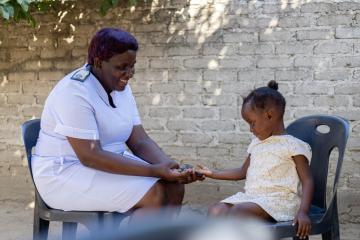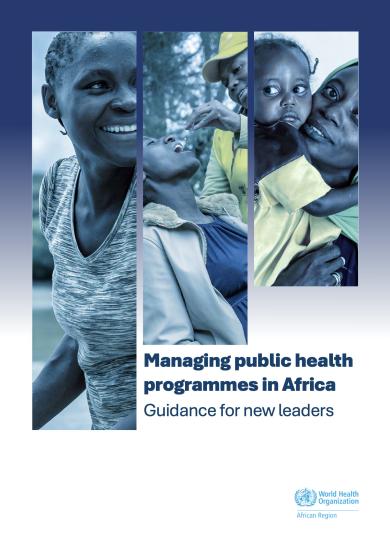Key Facts:
- Noncommunicable diseases (NCDs) kill 41 million people each year, equivalent to 71% of all deaths globally.
- Each year, more than 15 million people die from a NCD between the ages of 30 and 69 years; 85% of these "premature" deaths occur in low- and middle-income countries.
- 77% of all NCD deaths are in low- and middle-income countries.
- Cardiovascular diseases account for most NCD deaths, or 17.9 million people annually, followed by cancers (9.3 million), respiratory diseases (4.1 million), and diabetes (1.5 million).
- These four groups of diseases account for over 80% of all premature NCD deaths.
- Tobacco use, physical inactivity, the harmful use of alcohol and unhealthy diets all increase the risk of dying from a NCD.
- Detection, screening and treatment of NCDs, as well as palliative care, are key components of the response to NCDs.
Noncommunicable diseases (NCDs) along with mental health, cause nearly three-quarters of deaths in the world. In 2019, NCDs caused 41 million deaths globally, a number which is expected to increase due to increasing population, especially the population of older adults.
Of the ten leading causes of death globally, seven are NCDs: ischaemic heart disease, strokes, chronic obstructive pulmonary disease (COPD), lung cancer, dementias, diabetes, and kidney diseases; together these causes of death comprise 74% of deaths globally. At the same time however, all countries have achieved a reduction of the likelihood of premature death from NCDs.
NCDs disproportionately affect people in low- and middle-income countries, where more than three-fourths of global NCD deaths (31.4 million) occur.
In the WHO African Region, NCDs are increasingly becoming the main cause of mortality, and were responsible for 37% of deaths in 2019, rising from 24% in 2000. Of crucial significance is also the mental health burden in the region, with mental, neurological, and substance use disorders accounting for over 6% of the total disability-adjusted life years burden, representing more than 116 million individuals.
Cardiovascular diseases are the most frequent causes of NCDs deaths, responsible for approximately 13% of all deaths and 37% of all NCDs deaths in Africa. In 2020, there were around 1.1 million new cancer cases and 700,000 deaths in Africa. Africa accounts for 5.7 % of global cancer incidence but has a larger share of deaths, at more than 7 %. Cancer death rates in Africa are projected to exceed the global average by 30% in the next 20 years. The most common cancers in adults include breast (16.5%) and cervical (13.1%). There were 24 million people with diabetes in 2021. The total number of people with diabetes in the region is predicted to increase by 129% to 55 million by 2045.
Furthermore, Sickle Cell Disease, a genetic disease which causes high mortality rates in babies and children under the age of five, and significant morbidity and mortality in adults continues to be a major public health concern in the region. It is estimated that of the 300,000 to 400,000 newborns each year worldwide with SCD, 75% are born in Africa.
Other NCDs also cause significant disease burdens. These include vision impairment and blindness, oral diseases, and ear conditions. For example, 44% of the African region population suffer from oral diseases, including noma, while 111 million people in Sub-Saharan Africa alone have a form of vision impairment and 40 million (19% of the total population) people have disabling hearing loss.
Modifiable behavioral risk factors
Modifiable behaviours, such as tobacco use, physical inactivity, unhealthy diets and the harmful use of alcohol, all increase the risk of NCDs.
- Tobacco accounts for over 8 million global deaths every year (including from the effects of exposure to second-hand smoke).
- 1.8 million annual global deaths have been attributed to excess salt/sodium intake.
- More than half of the 3 million annual global deaths attributable to alcohol use are from NCDs, including cancer.
- 830 000 global deaths annually can be attributed to insufficient physical activity.
Metabolic risk factors
Metabolic risk factors contribute to four key metabolic changes that increase the risk of NCDs:
- raised blood pressure;
- overweight/obesity;
- hyperglycemia (high blood glucose levels); and
- hyperlipidemia (high levels of fat in the blood).
In terms of attributable deaths, the leading metabolic risk factor globally is elevated blood pressure (to which 19% of global deaths are attributed), followed by raised blood glucose and overweight and obesity.
Environmental risk factors
Several environmental risk factors contribute to NCDs. Air pollution is the largest of these, accounting for 6.7 million deaths globally, of which about 5.7 million are due to NCDs, including stroke, ischaemic heart disease, chronic obstructive pulmonary disease, and lung cancer.
Noncommunicable diseases (NCDs) are becoming the leading cause of mortality in sub-Saharan Africa.
Among these NCDs, chronic and severe NCDs like type 1 diabetes (T1D), acute rheumatic fever (ARF), rheumatic heart disease (RHD), and sickle cell disease (SCD) more frequently affect children and young adults. Early diagnosis, treatment, and care are critical to reducing the high mortality and morbidity that arise from these conditions. Factors that drive poor outcomes from these conditions include low awareness of the conditions at individual and community levels; poor access to services; health system weakness across all six pillars of the WHO health systems building blocks[1]; and poor resource allocation, including prioritization of service delivery from bilateral and multilateral partners and donors[2].
There are renewed regional and global opportunities to reduce the burden of chronic, severe, and other NCDs in the African region. For example, the regional framework for integrating essential NCD services in primary health care (PHC) was adopted during the 67th Regional Committee (RC) in the WHO African Region, which aims at guiding Member States on the integration of essential NCD interventions in PHC in order to scale up early detection, diagnosis, and treatment. Moreover, as part of efforts to reduce the high burden of premature mortality from chronic and severe NCDs within the context of universal health coverage (UHC), "PEN-Plus – A regional strategy to address severe chronic noncommunicable diseases at first level health facilities" was adopted at the 72nd RC in 2022. This strategy aims to improve access to prevention, treatment, and care for chronic and severe NCDs to rural and peri-urban populations by providing this care at first-level referral facilities, using standardized protocol-based management. The strategy sets out clear activities which, if implemented, would strengthen the capacity for comprehensive care for chronic and severe NCDs, as well as strengthen the implementation of the WHO package of essential noncommunicable (PEN).
It is in this context, with the financial support from the Hemsley Charitable Trust (HCT), the WHO Regional Office for Africa (AFRO) has initiated a three-year project in June 2023, to strengthen the implementation of the PEN-Plus Regional Strategy and thus ensure integrated prevention and control of chronic and severe NCDs in the WHO African Region, using T1D, SCD, ARF, and RHD as entry points.
This project contributes to the attainment of the SDG target 3.4 on NCD premature mortality reduction by strengthening the implementation of an integrated care delivery strategy among Africa's poorest children and young adults by increasing access to quality diagnosis, treatment, and care among rural and peri-urban populations.
This project consists of four pillars, with support of 20 PEN-Plus priority countries, including:
- engage for enhanced awareness of the PEN-Plus strategy, including organizing the annual PEN-Plus conference
- assess and prioritize evidence-based action
- drive improved disease management
- monitor and evaluate performance through results
[1] World Health Organization (WHO). Monitoring the building blocks of health systems: a handbook of indicators and their measurement strategies. Geneva, Switzerland: WHO;2010.
[2] Collins Téa E, Nugent Rachel, Webb Douglas, Placella Erika, Evans Tim, Akinnawo Ayodele et al. Time to align: development cooperation for the prevention and control of non-communicable diseases BMJ 2019; 366 :l4499
With support from Roche, AFRO launched an initiative in September 2023 to support better access to breast and cervical cancer detection, treatment and care services in Cote d’Ivoire, Kenya and Zimbabwe. Breast and cervical cancer currently constitute over half the cancer burden for women in sub-Saharan Africa. Between 60%–70% of women in African countries are diagnosed at a late stage, and only one in two women diagnosed with breast cancer in an African country will survive five years. Breast cancer five-year survival rates in high-income countries exceed 90%.
The initiative in the three countries includes health promotion, screening, early diagnosis and treatment, as well as general primary care and screening for other noncommunicable diseases. In addition, early detection services will be integrated into existing cervical cancer screening clinics to ensure both old and new systems are unified. The aim is to provide an integrated and holistic system of health care that will contribute to addressing the burden of breast and cervical cancer in the African Region.
The new initiative being rolled out in the three countries seeks to increase health care worker’s ability to provide cancer care within communities through training and will supply and deliver the necessary equipment and essential supplies to support women at primary health care level.








